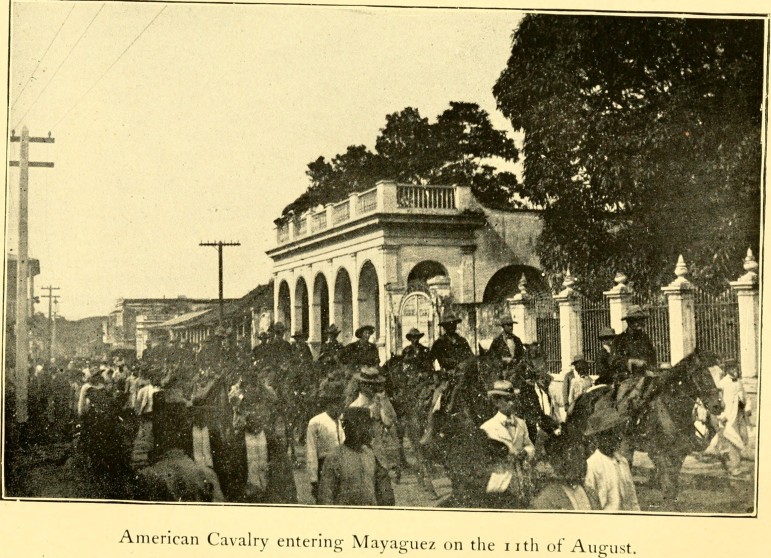
Karl Stephen Hermann
American military maneuvers on Puerto Rico.
Nelson A. Denis’ powerful and enlightening book, War Against All Puerto Ricans: Revolution and Terror in American’s Colony, documents in brutal detail the United States’ complicity in promoting and maintaining Puerto Rico’s colonial status. Denis pulls no punches. He makes it plain that Puerto Rico’s current crisis is no accident, but instead the result of decades of mainland-based corporate greed and studied neglect. The following passage illustrates the island’s current straits:
“A corporate red carpet stretches from San Juan to Wall Street. Every year, a new wave of entrepreneurs (a/k/a carpetbaggers) rolls in from El Norte with fast-money schemes disguised as ‘economic development projects.’ For fifty years, this charade has drained the island’s economy and, more tragically, its spirit.”
There’s another word to describe the plundering of Puerto Rico: “shakedown.”
It certainly must feel that way for many of the island’s 3.5 million residents, who are now waiting to see what Congress – an institution where they have no vote – will come up with as a fix for Puerto Rico’s beleaguered economy.
Of course, many have chosen not to wait. In the last decade more than 400,000 residents of Puerto Rico have left, driven to the mainland by high costs of electricity, gas and water, increased property and sales taxes, a shrinking economy and high unemployment.
Puerto Rico’s massive public debt, which comes to $72 billion – or $22,000 for every man, woman and child on the island – is the cumulative effect of decades of U.S. imperialism, paternalism and capitalism. It is the consequence of an economic model which used the displacement of Puerto Ricans into the U.S., primarily New York City, to prime U.S. corporate interests and further their ownership of the mainstays of the island’s economy.
For more than a century, all the way back to the United States taking possession of the island in 1898, U.S. interests have always trumped the interests of Puerto Rico and its residents. And though the details are still being ironed out, you can bet any “rescue plan” Congress cooks up will be no different.
Sure, Puerto Rico may be offered some modest bankruptcy protection, and some relief from creditors, but the price it will be forced to pay will be steep. It’s a certainty that any agreement will include the institution of a financial control board with powers to raise taxes, cut spending and impose austerity measures.
Some relief from a portion of Puerto Rico’s debt could result from a favorable ruling by the Supreme Court in June. That’s when the high court is expected to decide on an appeal of a lower court decision denying Puerto Rico public utilities the ability to restructure $20 billion owed to bondholders.
For Mr. Denis, whose book is the product of decades’ worth of interviews, Puerto Rico’s future economic health and the well-being of its residents starts with freeing the island from the stranglehold of de facto colonialism. That means doing away with federal laws such as the Jones Act, and other obstacles standing in the way of Puerto Rico building a sustainable economy and exercising true autonomy over its affairs.
A discussion of the main themes of his book will be the subject of a panel this evening in Harlem co-sponsored by the Community Service Society. The panel will also touch on how far we’ve come in addressing poverty and economic mobility among Puerto Ricans living in the city, particularly Puerto Rican youth. And it will also attempt to answer this question: What can Puerto Ricans who migrate to New York City today expect in the current and future city economy?
There are nearly 716,000 Puerto Ricans living in New York City – the largest representation of any Latino group. Yet, Puerto Rican youth have the highest poverty rates (34 percent), the highest rates of disconnection from school and the labor market, and the highest unemployment rates of any group. Among Puerto Rican men, the unemployment rate was 10.3 percent in 2015 – more than three points higher than for Latinos men overall and a point higher than for black men, traditionally the group most associated with high rates of unemployment.
From our research, we know we have to make a better effort to understand the challenges that stand in the way of success for Puerto Rican youth, particularly young men. Just as we know forging an economically-vibrant Puerto Rico begins with the United States owning up to its role in creating the present fiscal mess.
David R. Jones, esq., is the president and CEO of the Community Service Society of New York and a member of the City Limits board of trustees.








